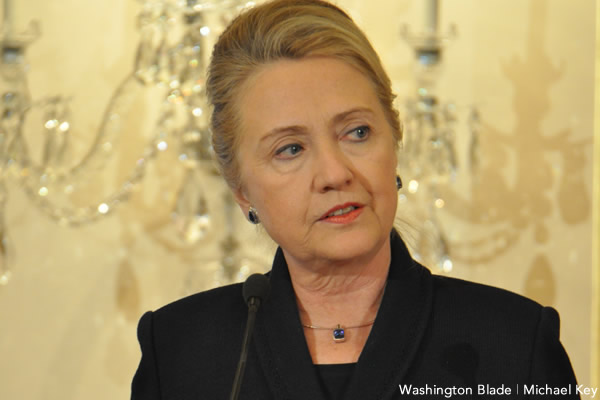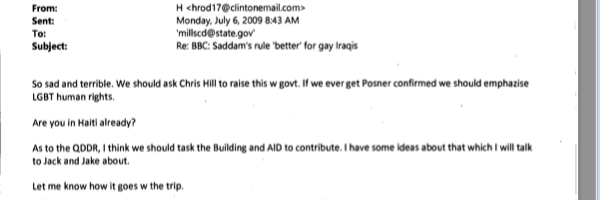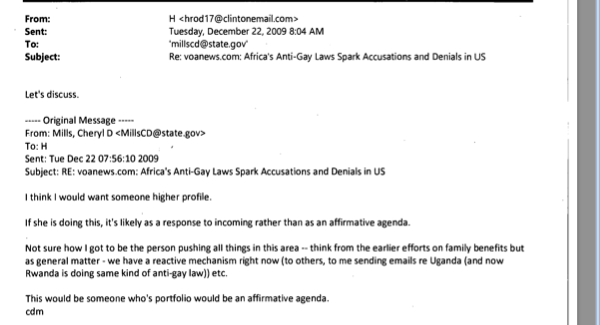News
Clinton emails: ‘We should emphasize LGBT human rights’
Former secretary of state responds to Iraq, creation of LGBT liaison


Hillary Clinton called for emphasis of LGBT rights in her State Department emails. Washington Blade photo by Michael Key)
Clinton, who’s now pursing the Democratic nomination for president in 2016, expressed the view in response to a 2009 Voice of America report forwarded to her by adviser Cheryl Mills on the alleged murder and torture of gay Iraqi men, many of whom reportedly said they were more secure under the regime of Saddam Hussein.
Clinton responded 11 minutes after Mills sent her the article.
“So sad and terrible,” Clinton writes. “We should ask Chris Hill to raise this w govt. If we ever get Posner confirmed we should emphasize LGBT human rights.”
The Chris Hill to which Clinton is referring is likely the U.S. ambassador to Iraq during the first two years of the Obama administration. Posner is likely Michael Posner, who came to serve in the State Department after his confirmation as assistant secretary of state for democracy, human rights and labor.
Clinton’s call for pushing LGBT rights within the State Department is consistent with her stated philosophy that “gay rights are human rights and human rights are gay rights” and her 2011 speech in Geneva in which she highlighted international LGBT rights concerns.
Other emails in the batch unveiled on Tuesday, which span from March to December 2009, demonstrate the hang-wringing on the perceived lack of progress on LGBT issues in the first years of the Obama administration and the potential creation of a State Department official dedicated to LGBT human rights.
The emails reveal that among the individuals forwarding articles to the Clinton State Department on LGBT rights was Richard Socarides, a gay New York-based advocate who advised former President Bill Clinton on gay rights issues.
Socarides told the Washington Blade that as a former White House official he sometimes passed along information and reports he thought would be of interest to the State Department. Sometimes, Socarides said, Clinton’s staff reached out to him with a specific question.
“From what I can tell, these emails are all part of that back-and-forth,” Socarides.
In one email to Mills, Socarides forwards a Gay City News article on anti-LGBT brutality in Iraq and writes, “You guys will have to deal with this at some point if not already.”
In response to the exchange, Socarides expressed satisfaction with how issues related to the rights of LGBT Iraqis were handled, saying it was part of ongoing concern about the country and “raised by our government at many levels and on repeated occasions.”
In another email dated May, 22, 2009, Mills forwards to Clinton an article in the Advocate on a draft letter signaling the State Department’s intention to extend partner benefits to gay Foreign Service officers.
Clinton’s response isn’t revealed, but Mills commentary on the article is simply “Oh my.”
In another December 2009 email in which he forwards a Voice of America article on evangelical leaders spreading anti-gay sentiment in Africa, Socarides recommends the creation of an international LGBT point person.
“There is a lot of appreciation for everything the Dept has done around this so far and I think you could really build on it by putting someone there in charge of international LGBT human right issues,” Socarides said.
Socarides’ email was in turn forwarded to Clinton by Mills, who endorsed the idea, saying, “I think this is a good idea — what do you think?”
Clinton’s initial response was “Mira patel in sp told me she is already starting to do this. Do you want someone in drl.” The rest of Clinton’s response is redacted by the State Department. Mira Patel served at the State Department as an advisor for Clinton after having served on her Senate staff.
The response from Clinton apparently wasn’t adequate for Mills, who responded she “would want someone higher profile” and Patel is likely preparing a “response to incoming rather as an affirmative agenda.”
“Not sure how I got to be the person pushing all things in this area — think from the earlier reports on family benefits but as a general matter — we have a reaction mechanism right how (to others, to me sending emails re Uganda (and now Uganda is doing same kind of anti-gay law)) etc.,” Mills writes. “This would be someone who’s profile would be an affirmative agenda.”
Clinton has a short response to Mills eight minutes later, “Let’s discuss.” The Clinton emails don’t reveal the resolution of this discussion, which may have been taken offline.
In response to the email exchange, Socardies pointed to the appointment of Daniel Baer as deputy assistant secretary in the Bureau of Democracy, Human Rights & Labor. Part of the portfolio for Baer, who now serves as U.S. ambassador to Organization for Security & Cooperation in Europe, was international LGBT rights issues.
No specific LGBT international affairs official was appointed during Clinton’s tenure, but the State Department named Randy Berry as special envoy for the human rights of LGBTI persons under current Secretary of State John Kerry.
The emails unveiled by the State Department aren’t the last missives expected to be made public. As a result of a Freedom of Information Act request and the direction from Clinton herself, the emails are slated to keep coming on a rolling basis and all 55,000 pages should be public by Jan. 29. Clinton deleted an estimated 32,000 emails on recommendation from her legal team.
Over the course of her tenure at the State Department period, Clinton opposed same-sex marriage. The Blade could find no emails discussing the issue or any potential evolution on her views. Clinton endorsed same-sex marriage after she left the State Department in 2013.
National
Supreme Court deals blow to trans student privacy protections
Under this ruling, parents are entitled to be informed about their children’s gender identity at school, regardless of state protections for student privacy.

The Supreme Court on Monday blocked a California policy that allowed teachers to withhold information about a student’s gender identity from their parents.
The policy had permitted California students to explore their gender identity at school without that information automatically being disclosed to their parents. Now, educators in the state will be required to inform parents about developments related to a student’s gender identity, depending on how the case proceeds in lower courts.
The case involves two sets of parents — identified in court filings as John and Jane Poe and John and Jane Doe — both of which say their daughters began identifying as boys at school without their knowledge, citing religious objections to gender transitioning.
The Poes say they only learned about their daughter’s gender dysphoria after she attempted suicide in eighth grade and was hospitalized. After treatment for the attempt and after being returned to school the following year, teachers continued using a male name and pronouns despite the parents’ objections, citing California law. The Poes have since placed their daughter in therapy and psychiatric care.
Similarly, the Does say their daughter has intermittently identified as a boy since fifth grade, but while their daughter was in seventh grade, they confronted school administrators over concerns that staff were using a male name and pronouns without informing them. The principal told them state law barred disclosure without the child’s consent.
Both sets of parents filed lawsuits in the U.S. District Court for the Southern District of California challenging the state policy that protects students’ gender identity and limits when schools can disclose that information to parents.
The justices voted along ideological lines, with the court’s six conservative members in the majority and the three liberal justices dissenting.
“We conclude that the parents who seek religious exemptions are likely to succeed on the merits of their Free Exercise Clause claim,” the court said in an unsigned order. “The parents who assert a free exercise claim have sincere religious beliefs about sex and gender, and they feel a religious obligation to raise their children in accordance with those beliefs. California’s policies violate those beliefs.”
In dissent, the three liberal justices argued that the case is still working its way through the lower courts and that there was no need for the high court to intervene at this stage. Justice Elena Kagan wrote, “If nothing else, this Court owes it to a sovereign State to avoid throwing over its policies in a slapdash way, if the Court can provide normal procedures. And throwing over a State’s policy is what the Court does today.”
Conservative Justices Samuel Alito and Clarence Thomas indicated they would have gone further and granted broader relief to the parents and teachers challenging the policy.
The emergency appeal from a group of teachers and parents in California followed a decision from the United States Court of Appeals for the Ninth Circuit that allowed the state’s policy to remain in effect. The appeals court had paused an order from U.S. District Judge Roger Benitez — who was nominated by George W. Bush — that sided with the parents and teachers and put the policy on hold.
The legal challenge was backed by the Thomas More Society, which relied heavily on a decision last year in which the court’s conservative majority sided with a group of religious parents seeking to opt their elementary school children out of engaging with LGBTQ-themed books in the classroom.
California Attorney General Rob Bonta expressed disappointment with the ruling. “We remain committed to ensuring a safe, welcoming school environment for all students while respecting the crucial role parents play in students’ lives,” his office said in a statement.
The decision comes as the Trump administration has taken a hardline approach to transgender rights. During his State of the Union address last week, President Donald Trump referenced Sage Blair, who previously identified as transgender and later detransitioned, describing Blair’s experience transitioning in a public school. According to the president, school employees supported Blair’s chosen gender identity and did not initially inform Blair’s parents.

Last year, the court upheld Tennessee’s ban on gender-affirming medical care for transgender minors and has allowed enforcement of a policy barring transgender people from serving in the military to continue during Trump’s second term.
District of Columbia
D.C. Black Pride theme, performers announced at ‘Speakeasy’
Durand Bernarr to headline 2026 programming

The Center for Black Equity held its 2026 DC Black Pride Theme Reveal event at Union Stage on Monday. The evening, a “Speakeasy Happy Hour,” was hosted by Anthony Oakes and featured performances by Lolita Leopard and Keith Angelo. The Center for Black Equity organizes DC Black Pride.
Kenya Hutton, Center for Black Equity president and CEO, spoke following the performances by Leopard and Angelo. Hutton announced this year’s theme for DC Black Pride: “New Black Renaissance.”
Performers for 2026 DC Black Pride were announced to be Bang Garcon, Be Steadwell, Jay Columbus, Bennu Byrd, Rue Pratt and Akeem Woods.
Singer-songwriter Durand Bernarr was announced as the headliner for the 2026 festivities. Bernerr gave brief remarks through a video played on the screen at the stage.
DC Black Pride is scheduled for May 22-25. For more information on DC Black Pride, visit dcblackpride.org.
Virginia
Arlington LGBTQ bar Freddie’s celebrates 25th anniversary
Owner asks public to support D.C.-area gay bars

An overflowing crowd turned out Sunday night, March 1, for the 25th anniversary celebration of Freddie’s Beach Bar, the LGBTQ bar and restaurant located in the Crystal City section of Arlington, Va.
The celebration began as longtime patrons sitting at tables and at the bar ordered drinks, snacks, and full meals as several of Freddie’s well-known drag queens performed on a decorated stage.
Roland Watkins, an official with Equality NoVa, an LGBTQ advocacy organization based in the Northern Virginia areas of Arlington, Alexandria, and Fairfax County, next told the gathering about the history of Freddie’s Beach Bar and the role he said that owner Freddie Lutz has played in broadening the bar’s role into a community gathering place.
“Twenty-five years ago, opening a gay bar in Arlington was not a given,” Watkins told the crowd from the stage. “It took courage, convincing, and a deep belief that our community belongs openly, visibly, and proudly,” he said. “And that belief came from Freddie.”
Watkins and others familiar with Freddie’s noted that under Lutz’s leadership and support from his staff, Freddie’s provided support and a gathering place for LGBTQ organizations and a place where Virginia elected officials, and candidates running for public office, came to express their support for the LGBTQ community.
“Over the past 25 years, Freddie’s has become more than a bar,” Watkins said. “It has become a community maker.”
Lutz, who spoke next, said he was moved by the outpouring of support from long-time customers. “Thank you all so much for coming tonight and thank you all so much for your support over the past 25 years,” he said. “I can’t tell you how much that means to me and how much it’s kept me going.”
But Lutz then said Freddie’s, like many other D.C. area gay bars, continues to face economic hard times that he said began during the COVID pandemic. He noted that fewer customers are coming to Freddie’s in recent years, with a significant drop in patronage for his once lucrative weekend buffet brunches.
“So, I don’t want to be the daddy downer on my 25-year anniversary,” he said. “But this was actually the worst year we’ve ever had,” he added. “And I guess what I’m asking is please help us out. Not just me, but all the gay bars in the area.” He added, “I’m reaching out and I’m appealing to you not to forget the gay bars.”
Lutz received loud, prolonged applause, with many customers hugging him as he walked off the stage.
-

 India5 days ago
India5 days agoActivists push for better counting of transgender Indians in 2026 Census
-

 Advice5 days ago
Advice5 days agoDry January has isolated me from my friends
-

 National5 days ago
National5 days agoAfter layoffs at Advocate, parent company acquires ‘Them’ from Conde Nast
-

 District of Columbia5 days ago
District of Columbia5 days agoCapital Pride reveals 2026 theme























